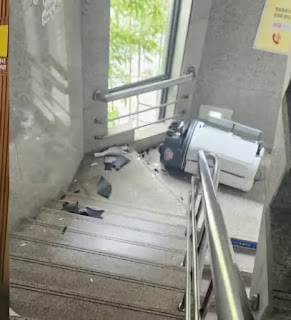ಧರಣಿಯೊಳು ಅರಸುಗಳು ನಾಲ್ವರು
ಭೂರಿ ಸತ್ಯವ್ರತರು ನಳನೃಪ
ಧೀರ ರಾಮ ಯುಧಿಷ್ಠರ ಹರಿಶ್ಚನ್ದ್ರರಿವರೆಂದು
ಸಾರುತಿದೆ ಜಗವೆಲ್ಲ ನಿಮ್ಮನು
ದಾರನಿದರೊಳು ರಘುಪತಿಯ ಗುಣ
ಹಾರ ಧರ್ಮವ ಪಾಲಿಸಿದ ನರೆದಲೆಗೆ ವ್ರಿಹಿಯರಿಗೆ
ಈ ಮಾತು ಕೇಳಿದ ಧರ್ಮರಾಯನು "ಶ್ರೀರಾಮಚಂದ್ರನು ನರೆದಲೆಗ ಮತ್ತು ವ್ರಿಹೀಯರಿಗೆ ನ್ಯಾಯ ಕೊಟ್ಟ ಕಥೆಯನ್ನು ದಯವಿಟ್ಟು ಹೇಳಿ" ಎಂದು ಕೇಳಿಕೊಂಡನು. (ನರೆದಲಗ ಅಂದರೆ ರಾಗಿ. ವ್ರಿಹೀಗ ಅಂದರೆ ಅಕ್ಕಿ. ಇವೆರಡು ಆ ಧಾನ್ಯಗಳ ಮೊದಲಿನ ಹೆಸರು.) ಆಗ ಶಾಂಡಿಲ್ಯ ಮಹರ್ಷಿಗಳು ಅಕ್ಕಿ ಮತ್ತು ರಾಗಿಗಳಿಗೆ ತಮ್ಮಲ್ಲಿ ಯಾರು ಶ್ರೇಷ್ಠ ಎಂದು ಜಗಳ ಬಂದ ಸಂದರ್ಭ ಮತ್ತು ಶ್ರೀರಾಮನು ಅದನ್ನು ಪರಿಹರಿಸಿ ನ್ಯಾಯವನ್ನು ಕೊಟ್ಟ ರೀತಿಯನ್ನೂ ವಿವರಿಸುತ್ತಾರೆ.
*****
ನಂತರದ ಇಪ್ಪತ್ತು ಪದ್ಯಗಳಲ್ಲಿ ಶಾಂಡಿಲ್ಯ ಮಹರ್ಷಿಗಳು ಧರ್ಮರಾಯನಿಗೆ ಶ್ರೀರಾಮನ ಜನನದಿಂದ ರಾವಣ ವಧೆಯವರೆಗಿನ ಕಥೆಯನ್ನು ಸಂಗ್ರಹವಾಗಿ ಹೇಳುತ್ತಾರೆ. ಯುದ್ಧ ಮುಗಿದ ಮೇಲೆ ಶ್ರೀರಾಮನು ಸೀತಾದೇವಿ ಮತ್ತಿತರರ ಸಮೇತ ಅಯೋಧ್ಯೆಗೆ ಹಿಂದಿರುಗುವ ವಿವರವನ್ನು ಕೊಡುತ್ತಾರೆ. ಹೀಗೆ ಹಿಂದಿರುಗಿ ಬರುವಾಗ ಅನೇಕ ಋಷಿಪುಂಗವರು ಶ್ರೀರಾಮನನ್ನು ಎದುರುಗೊಂಡು, ಸ್ವಾಗತಿಸಿ ಅವನಿಗೆ ಸೊಗಸಾದ ಔತಣಕೂಟ ಏರ್ಪಡಿಸುತ್ತಾರೆ. ಅನೇಕ ಋಷಿಗಳ ಬಹಳ ಶಿಷ್ಯರು ನಾನಾವಿಧ ಭಕ್ಷ್ಯ ಭೋಜ್ಯಗಳನ್ನು ಹೆಡಿಗೆಗಳಲ್ಲಿ ತಂದು ಪೇರಿಸಿ ಶ್ರೀರಾಮ ಮತ್ತು ಅವನ ಜೊತೆ ಬಂದವರೆಲ್ಲರಿಗೆ ಬಡಿಸುತ್ತಾರೆ. ಆಗ ಔತಣಕ್ಕೆ ಉಪಯೋಗಿಸಿದ ಧಾನ್ಯಗಳ ವಿವರ ಹೀಗಿದೆ:
ನರೆದೆಲಗನಿದು ನೆಲ್ಲು ಹಾರಕ
ಬರಗು ಜೋಳವು ಕಂಬು ಸಾಮೆಯು
ಉರುತರದ ನವಣೆಯಿದು ನವಧಾನ್ಯವೆಂದೆನಲು
ಮೆರೆವ ರಾಶಿಯ ಕಂಡು ಇದರೊಳು
ಪರಮಸಾರದ ಹೃದಯನಾರೆಂ
ದರಸ ಕೇಳಿದನಲ್ಲಿಹ ಮಹಾಮುನೀಶ್ವರರ
ಆಗ ಉಪಯೋಗಿಸಿದ ನವಧಾನ್ಯಗಳು: ನರೆದೆಲಗ (ರಾಗಿ), ನೆಲ್ಲು (ಭತ್ತ ಅಥವಾ ಅಕ್ಕಿ), ಹಾರಕ, ಬರಗು, ಜೋಳ, ಕಂಬು, ಸಾಮೆ, ನವಣೆ ಮತ್ತು ಗೋಧಿ. ಆ ನವಧಾನ್ಯಗಳ ಪರಿಪರಿಯ ತಿಂಡಿ-ತಿನಿಸು ನೋಡಿ ಶ್ರೀರಾಮನು "ಇವುಗಳಲ್ಲಿ ಶ್ರೇಷ್ಠ ಧಾನ್ಯ ಯಾವುದು?" ಎಂದು ಅಲ್ಲಿ ಸೇರಿದ ಋಷಿ ಸಮುದಾಯವನ್ನು ಕೇಳುತ್ತಾನೆ. ಕಪಿಲ ಮುನಿಯು ಎಲ್ಲ ಧಾನ್ಯಗಳಲ್ಲಿ ರಾಗಿಯೇ ಶ್ರೇಷ್ಠ ಎಂದು ನಸು ನಗುತ್ತ ಹೇಳುತ್ತಾನೆ.
ಈ ಮಾತನ್ನು ಕೇಳಿದ ವ್ರಿಹಿಗೆ (ಅಕ್ಕಿಗೆ) ತಡೆಯಲಾರದ ಕೋಪ ಬರುತ್ತದೆ. ಎಲ್ಲರ ಮುಂದೆ ತನಗೆ ಹೀಗೆ ಅವಮಾನವಾಗಿದ್ದು ಕಂಡು ತನ್ನ ಗುಣಗಳನ್ನು ಹೋಗಳಿಕೊಂಡು ರಾಗಿಯನ್ನು ಮೂದಲಿಸುತ್ತದೆ. ರಾಗಿಯೂ ಸಹ ಅದಕ್ಕೆ ಉತ್ತರವಾಗಿ ಅಕ್ಕಿಯ ಹೀನ ಗುಣಗಳನ್ನೂ ತನ್ನ ಹಿರಿಮೆಯನ್ನೂ ಸಾರಿ ಹೇಳುತ್ತದೆ. ಶ್ರೀರಾಮನು ಎಲ್ಲರ ಮುಂದೆ ಹೀಗೆ ಜಗಳ ಮಾಡಿದ ತಪ್ಪಿಗೆ ಅವರಿಗೆ ಸೆರೆವಾಸದ ಶಿಕ್ಷೆ ಕೊಡುತ್ತಾನೆ. "ಇವರಿಬ್ಬರನ್ನೂ ಆರು ತಿಂಗಳ ಕಾಲ ಕಾರಾಗೃಹದಲ್ಲಿ ಇಡಿ. ನಂತರ ಯಾರು ಶ್ರೇಷ್ಠ ಎಂದು ನಾವು ನಿರ್ಣಯ ಕೊಡುತ್ತೇವೆ" ಎಂದು ಆಜ್ಞಾಪಿಸುತ್ತಾನೆ. ಅವರಿಬ್ಬರಿಗೆ ಇನ್ನು ಆರು ತಿಂಗಳ ಕಾಲ ಬಂಧನ! ಶ್ರೀರಾಮನ ಸಹಿತ ಎಲ್ಲರೂ ಅಯೋಧ್ಯೆ ಸೇರಿ ಶ್ರೀರಾಮ ಪಟ್ಟಾಭಿರಾಮ ಆಗಿ, ರಾಜಾರಾಮ ರಾಜ್ಯವಾಳುತ್ತಾನೆ.
*****
ಆರು ತಿಂಗಳ ಕಾಲ ಕಳೆಯಿತು. ರಾಜರಾಮನು ಹನುಮನನ್ನು ಕರೆದು ಗೌತಮ ಋಷಿಯನ್ನು ಕರೆತರಲು ಹೇಳುತ್ತಾನೆ. ಹನುಮನು ಗೌತಮರಲ್ಲಿ ಈ ವಿಷಯ ತಿಳಿಸಲು ಅವರು ರಾಜರಾಮನ ಆಸ್ಥಾನಕ್ಕೆ ಬರುತ್ತಾರೆ. ಅನೇಕ ಋಷಿ-ಮುನಿಗಳು, ಅಧಿಕಾರಿಗಳು, ಪಂಡಿತರು, ಸಾಮಾನ್ಯ ಜನರು ಶ್ರೀರಾಮನ ಆಸ್ಥಾನದಲ್ಲಿ ಸೇರುತ್ತಾರೆ. ಪ್ರಭು ರಾಮಚಂದ್ರನು ಸೆರೆಯಲ್ಲಿರುವ ಎರಡು ಧಾನ್ಯಗಳನ್ನು ಆಸ್ಥಾನಕ್ಕೆ ಕರೆಸುತ್ತಾನೆ.
ಆರು ತಿಂಗಳು ಸೆರೆವಾಸದ ನಂತರ ವ್ರಿಹಿ (ಅಕ್ಕಿ) ಸೊರಗಿಹೋಗಿರುತ್ತದೆ. ಸೊಂಟ ಮುರಿದು ಆಸ್ಥಾನದಲ್ಲಿ ಬೀಳುತ್ತದೆ. ನರೆದೆಲಗ (ರಾಗಿ) ಸ್ವಲ್ಪವೂ ಕಾಂತಿ ಕಳೆಯದೆ ಮೊದಲಿನಂತೆಯೇ ಇರುತ್ತದೆ. ಇಬ್ಬರನ್ನೂ ನೋಡಿ ಶ್ರೀರಾಮನು "ನರೆದೆಲಗವೇ (ರಾಗಿ) ಶ್ರೇಷ್ಠ" ಎಂದು ತೀರ್ಪು ಕೊಡುತ್ತಾನೆ. ಇನ್ನುಮುಂದೆ ನರೆದಲಗವು "ರಾಮಧಾನ್ಯ" ಎಂಬ ಹೆಸರಿನಿಂದ ಗುರುತಿಸಲ್ಪಡಲಿ ಎಂದು ವರ ಕೊಡುತ್ತಾನೆ. ರಾಗಿಗೆ ಬಹಳ ಸಂತೋಷ ವಾಗುತ್ತದೆ. ಋಷಿಗಳೆಲ್ಲರೂ ರಾಗಿಗೆ ಅನೇಕ ವರಗಳನ್ನು ಕೊಡುತ್ತಾರೆ. ರಾಮಧಾನ್ಯವು ಬರಬರುತ್ತ ಆಡುಭಾಷೆಯಲ್ಲಿ ರಾಗಿ ಎಂದು ಪ್ರಖ್ಯಾತವಾಗುತ್ತದೆ.
ರಾಗಿಯು ಸನ್ಮಾನಿತವಾದ ಮೇಲೆ ನೆಲ್ಲು (ಅಕ್ಕಿ) ದುಃಖಿತನಾಗಿ ಪೆಚ್ಚು ಮೊರೆ ಹಾಕಿಕೊಂಡು ತಲೆ ತಗ್ಗಿಸಿ ನಿಲ್ಲುತ್ತದೆ. ಆಗ ಶ್ರೀರಾಮನು ಅಕ್ಕಿಯನ್ನು ಹತ್ತಿರ ಕರೆದು ಹೀಗೆ ಹೇಳುತ್ತಾನೆ:
ದೇವರಿಗೆ ಪರಮಾನ್ನನೀ ಮನು
ಜಾವಳಿಗೆ ಪಕ್ವಾನ್ನವೀತನು
ನೀವು ಧರೆಯೊಳಗಿಬ್ಬರತಿ ಹಿತದಲಿ ನೀವಿಹುದು
ನಾವು ಕೊಟ್ಟೆವು ವರವ ಸಲ್ಲುವು
ದಾವ ಕಾಲದಲಿನ್ನು ನೀವೇ
ಪಾವನರು ಪರಮ ಸುಖಿಯೆನ್ದುಪಚರಿಸಿದನು ನೃಪತಿ
"ನೀನು ದೇವತೆಗಳಿಗೆ ನೀಡುವ ನೈವೇದ್ಯದದ ಧಾನ್ಯ. ಆದರೆ ರಾಗಿಯಾದರೋ ಸಾಮಾನ್ಯ ಮನುಷ್ಯರಿಗೆ ದಿನನಿತ್ಯದ ಆಹಾರ ಪದಾರ್ಥ. ನೀವಿಬ್ಬರೂ ಈ ಭೂಮಿಯಲ್ಲಿ ಹೊಂದಿಕೊಂಡು ಬಾಳಬೇಕು. ನೀವಿಬ್ಬರೂ ಎಂದಿಗೂ ಮಿತ್ರರಾಗಿ ಎಲ್ಲ ಜನರಿಗೆ ಉಪಕಾರಿಯಾಗಿ ಬದುಕಿರಿ ಎನ್ನುವುದೇ ನಮ್ಮ ಅಪೇಕ್ಷೆ" ಎಂದ ಪ್ರಭು ರಾಮನು ಅಕ್ಕಿಯನ್ನು ಮುಂದೆ ಇನ್ನಷ್ಟು ಸಮಾಧಾನಪಡಿಸುತ್ತಾನೆ:
ದೀನರಲಿ ದಾರಿದ್ರ್ಯ ಜನರಲಿ
ನೀನು ನಿರ್ದಯನೆಂದೆವಲ್ಲದೆ
ಹೀನಗಳೆದವರಲ್ಲ ನಿನ್ನನು ನಾವು ಸಭೆಯೊಳಗೆ
ಮಾನುಷನು ನಮ್ಮೆಡೆಗೆ ನೀ ಸುರ
ಧೇನುವಿಗೆ ಸಮ ನಿನ್ನ ಚಿತ್ತದಿ
ಹಾನಿದೋರಲದೇಕೆ ಬಿಡು ಬಿಡು ಚಿಂತೆ ಯಾಕೆಂದ
"ಬಡವರ, ದೀನ ದಲಿತರ ವಿಷಯದಲ್ಲಿ ನೀನು ಕರುಣಿಯಲ್ಲ ಎಂದು ಹೇಳಿದ್ದು ಮಾತ್ರವಲ್ಲದೆ ನಿನ್ನನು ಕೀಳು ಎಂದು ನಾವು ಹೇಳಲಿಲ್ಲ. ನಿನ್ನ ಯೋಗ್ಯತೆ ಬಹಳ ದೊಡ್ಡದು. ನೀನು ಕಾಮಧೇನುವಿಗೆ ಸಮನು. ಮನಸ್ಸಿನಲ್ಲಿ ಚಿಂತೆಯಿಂದ ಕೊರಗಬೇಡ." ಎಂದು ಹೇಳಿ ಅಕ್ಕಿಗೂ ಸನ್ಮಾನ ಮಾಡಿ ಕಳಿಸಿಕೊಟ್ಟನು ಶ್ರೀರಾಮ.
*****
ಶಾಂಡಿಲ್ಯ ಮಹರ್ಷಿಗಳು ಧರ್ಮರಾಯನಿಗೆ ಈ ರೀತಿ ಶ್ರೀರಾಮಚಂದ್ರನು ಪ್ರಜಾವತ್ಸಲನಾಗಿ, ನ್ಯಾಯ ನಿಷ್ಠುರನಾಗಿದ್ದರೂ ಯಾರ ಮನಸ್ಸಿಗೂ ನೋವಾಗದಂತೆ ಆಡಳಿತ ಮಾಡುವ ಸೂಕ್ಷ್ಮತೆ ತೋರಿಸಿದ ಬಗೆಯನ್ನು ವಿವರಿಸಿದರು. ಈ ಧಾನ್ಯಗಳೆರಡರ ಜಗಳ-ನ್ಯಾಯದ ನೆವದಲ್ಲಿ ಶಾಂಡಿಲ್ಯ ಮಹರ್ಷಿಗಳು ಧರ್ಮರಾಯನಿಗೆ ಶ್ರೀರಾಮಚಂದ್ರನ ಪಟ್ಟಾಭಿಷೇಕದ ವೈಭವನ್ನು ವರ್ಣನೆ ಮಾಡುತ್ತಾರೆ. ಶ್ರೀರಾಮಚಂದ್ರನಿಗೂ ವನವಾಸದ ನಂತರ ಪಟ್ಟಾಭಿಷೇಕವಾಯಿತು ಎಂದು ಹೇಳುವುದರಲ್ಲಿ ಮುಂದೆ ಈ ವನವಾಸದ ನಂತರ ನಿನಗೂ ಮತ್ತೆ ರಾಜ್ಯಾಭಿಷೇಕವಾಗುತ್ತದೆ ಎನ್ನುವುದನ್ನು ಸೂಚ್ಯವಾಗಿ ತಿಳಿಸುತ್ತಾರೆ.
ಶ್ರೀರಾಮನ ಈ ಕಥೆಯ ವಿವರಣೆಯನ್ನು ಕೇಳಿದ ಧರ್ಮರಾಯನು "ಮನಸ್ಸಿನ ಚಿಂತೆ ಕಳೆಯಿತು, ಪರಮ ಪಾವನವಾದ ಶ್ರೀರಾಮಚಂದ್ರನ ಕಥೆಯನ್ನು ನಿಮ್ಮಂತಹವರ ಸಾನ್ನಿಧ್ಯದಿಂದ ಕೇಳಿ ಮಂಕು ಕಳೆಯಿತು. ಕೃತಾರ್ಥನಾದೆ", ಎಂದು ಶಾಂಡಿಲ್ಯ ಮಹರ್ಷಿಗೆ ಯಥೋಚಿತ ಸತ್ಕಾರ ಮಾಡಿ ಬೀಳ್ಕೊಟ್ಟನು.
*****
ಶ್ರೀ ಕನಕದಾಸರ "ರಾಮಧಾನ್ಯ ಚರಿತ್ರೆ" ಎಂಬ ಕಾವ್ಯದ ಸಂಕ್ಷಿಪ್ತ ತಿರುಳು ಮೇಲೆ ಹೇಳಿದ ವಿವರಣೆ.
"ಭಕ್ತ ಕನಕದಾಸ" ಎಂದೇ ಹೆಸರಾದ ಶ್ರೀ ಕನಕದಾಸರು ನಮ್ಮ ನಾಡು ಕಂಡ ಅಪರೂಪದ ಮತ್ತು ಬಹುಮುಖ ಪ್ರತಿಭೆಯ ವ್ಯಕ್ತಿ. ತಮ್ಮ ಜೀವನದಲ್ಲಿ ಅವರು ಬಹಳ ನೊಂದವರು. ಮೇಲ್ವರ್ಗದವರ ತಿರಸ್ಕಾರ, ಹಿಂಸೆಗಳನ್ನು ಅನುಭವಿಸಿದವರು. ಆದರೆ ಅವರ ಕೃತಿಗಳಲ್ಲಿ ನಾವು ಕಹಿಯನ್ನು ಕಾಣುವುದಿಲ್ಲ. ಅವರೊಬ್ಬ ಅಪ್ರತಿಮ ಕವಿ. ಅಷ್ಟೇ ಅಲ್ಲ. ಅವರು ನಾಡು ಕಂಡ ಬಹು ಮೌಲ್ಯದ ಸಂತ, ಸಮಾಜ ಸುಧಾರಕ ಮತ್ತು ದಾರ್ಶನಿಕ. ಹದಿನಾರನೆಯ ಶತಮಾನದಲ್ಲಿ ಜೀವಿಸಿದ್ದ ದಾಸರು ನೂರು ವರುಷಗಳ ತುಂಬು ಜೀವನ ನಡೆಸಿದವರೆಂದು ನಂಬಿಕೆ.
ಸೊಗಸಾದ ಪ್ರೌಢ ಕನ್ನಡ ನುಡಿಯನ್ನು ಅವರು ತಮ್ಮ ಕಾವ್ಯಗಳಲ್ಲಿ ಬಳಸಿಕೊಂಡಿದ್ದರೆ, ಸರಳ ಕನ್ನಡದಲ್ಲಿಯೂ ಅನೇಕ ದೇವರನಾಮಗಳನ್ನು ನಮಗೆ ನೀಡಿದ್ದಾರೆ. "ಮೋಹನ ತರಂಗಿಣಿ", "ನಳ ಚರಿತ್ರೆ", "ರಾಮಧಾನ್ಯ ಚರಿತ್ರೆ", "ಹರಿಭಕ್ತಿಸಾರ" ಎಂಬ ಕಾವ್ಯಗಳನ್ನು ರಚಿಸಿದ್ದಾರೆ. ನೂರಾರು ದೇವಾರನಾಮಗಳನ್ನೂ ರಚಿಸಿದ್ದಾರೆ. ಅವರ ಒಗಟಿನಂತಹ "ಕನಕನ ಮುಂಡಿಗೆಗಳು" ಒಂದು ವಿಶೇಷ ರೀತಿಯ ರಚನೆಗಳು. ಕನಕರ ದೇವರನಾಮ ಒಂದಾದರೂ ಕೇಳದ ಕನ್ನಡಿಗನಿಲ್ಲ ಅಂದರೆ ತಪ್ಪಲ್ಲ. "ಕುಲ ಕುಲ ಕುಲವೆಂದು ಹೊಡೆದಾಡದಿರಿ" ಮತ್ತು "ಬಾಗಿಲನು ತೆರೆದು ಸೇವೆಯನು ಕೊಡೊ ಹರಿಯೇ" ಎಂಬ ದೇವಾರನಾಮಗಳನ್ನಂತೂ ಕೇಳದ ಕನ್ನಡಿಗರು ಇರಲಾರರು.
"ಮೋಹನತರಂಗಿಣಿ" 42 ಅಧ್ಯಾಯಗಳ 2,800 ಪದ್ಯಗಳ ದೊಡ್ಡ ಕೃತಿ. ಹರಿಭಕ್ತಿಸಾರ ೧೦೮ (108) ಪದ್ಯಗಳ ಭಾಮಿನಿ ಷಟ್ಪದಿಯ ಕೃತಿಯಾದರೆ "ರಾಮಧಾನ್ಯ ಚರಿತ್ರೆ" ಅದೇ ಷಟ್ಪದಿಯ ೧೫೮ (158) ಪದ್ಯಗಳುಳ್ಳ ಕೃತಿ. ರಾಮಧಾನ್ಯ ಚರಿತ್ರೆ ಒಂದು ರೀತಿಯಲ್ಲಿ ರಾಮಾಯಣದ ಕಥೆ. ಅದರಲ್ಲೂ ಶ್ರೀರಾಮಚಂದ್ರನ ಪಟ್ಟಾಭಿಷೇಕದ ವಿವರಣೆ ನೀಡುವ ಕೃತಿ. ಇದರ ಉದ್ದಕ್ಕೂ ಕಾವ್ಯಗುಣಗಳನ್ನು ಕಾಣಬಹುದು. ಗಮಕಿಗಳು ಸೊಗಸಾಗಿ ನಿರೂಪಣೆ ಮಾಡಬಹುದಾದ ಕೃತಿ.
ನರೆದೆಲಗ ಮತ್ತು ನೆಲ್ಲು (ರಾಗಿ ಮತ್ತು ಅಕ್ಕಿ) ಇವುಗಳ ಜಗಳವನ್ನು ಸಾಂಕೇತಿಕವಾಗಿ ಸಮಾಜದಲ್ಲಿರುವ "ವರ್ಗ ಸಂಘರ್ಷ" ನಿರೂಪಿಸುವುದಕ್ಕೆ ಬಳಸಿಕೊಂಡಿದ್ದಾರೆ. ಸಾಮಾನ್ಯವಾಗಿ ಜೀವನದಲ್ಲಿ ನೊಂದವರು ಒಂದು ರೀತಿಯ ಕ್ರಾಂತಿಕಾರಿಗಳಾಗಿ, ಅದಕ್ಕಿಂತ ಹೆಚ್ಚು ಬಂಡಾಯ ಪ್ರವೃತ್ತಿಯವರಾಗುವುದು ಸಾಮಾನ್ಯ. ಆದರೆ ಕನಕರದು ತುಂಬು ಮಾಗಿದ ಜೀವನಾನುಭವ. ಗುದ್ದಾಡುವುದಕ್ಕಿಂತ ಸಾಮರಸ್ಯದ ಜೀವನ ಅವರಿಗೆ ಹೆಚ್ಚು ಪ್ರಿಯ. ರಾಮಧಾನ್ಯ ಚರಿತ್ರೆಯಲ್ಲಿ ಇದರ ಪ್ರತಿಬಿಂಬವನ್ನು ನಾವು ಕಾಣಬಹುದು. ಸಮಾಜದಲ್ಲಿ ನಮಗೆ ಬೇಕಿದ್ದರೂ, ಬೇಡದಿದ್ದರೂ ವರ್ಗಗಳು ಇದ್ದೇ ಇರುತ್ತವೆ. ದೀನ-ದಲಿತರ ಪರವವಾಗಿ ನಿಲ್ಲುವವನೇ ಶ್ರೇಷ್ಠ ಎನ್ನುವುದು ರಾಗಿಯ ಶ್ರೇಷ್ಠತೆ ತೋರಿಸುವುದರಲ್ಲಿ ನೋಡಬಹುದು. ಸಮಾಜದಲ್ಲಿ ಮೇಲ್ವರ್ಗದವರಿಗೂ ಸ್ಥಾನ ಉಂಟು. ಆದರೆ ದೀನರ ಬಗ್ಗೆ, ಸಾಮಾನ್ಯ ಮನುಷ್ಯರ ಬಗ್ಗೆ ಕಳಕಳಿ ಇಲ್ಲದ ಮೇಲ್ವರ್ಗದ ಜನರಿಂದ ಪ್ರಯೋಜನವಿಲ್ಲ. ಈ ಸಂದೇಶವನ್ನು ಶ್ರೀರಾಮಚಂದ್ರನು ವ್ರಿಹೀಗೆ (ಅಕ್ಕಿಗೆ) ಹೇಳುವ ಸಮಾಧಾನದ ಮಾತುಗಳಲ್ಲಿ ಅರಿಯಬಹುದು.













